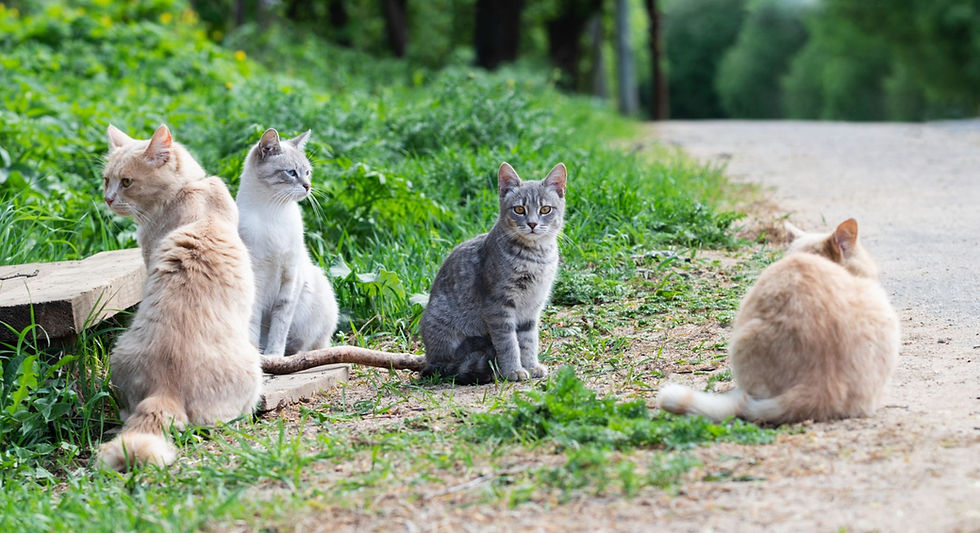🦝 Don’t Feed Wildlife — Here’s Why
- Louise Bailey
- Jul 14
- 3 min read
Updated: Jul 29

We get it — seeing a raccoon, deer, or possum wander up to your yard can feel magical. The urge to toss them a snack is strong. But did you know feeding wildlife — even “just a little” — can actually do more harm than good?
Here’s why:
✅ It changes natural behavior. Animals lose their natural fear of humans, start hanging around roads, yards, and parking lots — and too often get hurt, hit by cars, or removed as “nuisance” animals.
✅ It spreads disease. Gathering in one place to eat makes wildlife share parasites and diseases like distemper, parvo, and mange. Even backyard feeding stations can become hotspots.
✅ It harms native plants. Feeding deer leads to over‑browsing — they eat saplings and native wildflowers faster than they can grow, which affects birds, insects, and entire forests.
✅ It creates problems for your neighbors. Once wild animals get used to an easy meal, they often move in closer: multiplying, nesting in attics, chewing siding, raiding trash cans, or even preying on neighbors’ backyard chickens and pets when the food source dries up. What starts as kindness can spark real conflicts.
✅ It’s illegal in some places. Feeding deer or bears is actually prohibited in parts of Tennessee and surrounding states because of the dangers it creates — for animals and for people.
✅ It Disrupts the Natural Balance. When wildlife are artificially fed, they may become full and less motivated to hunt their natural prey. For example, birds that are full on bread or seeds may stop foraging for insects like mosquitoes or gnats — leading to a rise in those pest populations. This disrupts the natural "circle of life," where each species plays a vital role in keeping ecosystems balanced and disease-carrying vectors under control.
❤️ What to do instead:
Plant native shrubs, wildflowers & berry plants that naturally feed wildlife without overfeeding wildlife.
Leave brush piles and fallen logs for insects, birds & small mammals.
Keep trash bins secure and compost properly — help wildlife stay wild.
Resist the temptation to feed wildlife any food. No fresh fruit, no pet food, no cracked corn, no table scraps.
If you feed your pets on the front porch or yard, bring what they don't eat inside once they are done.
🦝 Rita the Raccoon says: Kind hearts keep wild hearts wild.
National Park Services agree! https://www.nps.gov/articles/000/idkt_feedingwildlife.htm
References
Chronic Wasting Disease (CWD) Management Zones
The Tennessee Wildlife Resources Agency (TWRA) prohibits placing grain, salt blocks, minerals, or other feed north of residence or structures within CWD Management Zones, which include Unicoi County. This regulation is geared toward reducing unnatural congregation of deer (and other cervids) to help prevent disease spread.https://www.tn.gov/content/tn/twra/hunting/cwd/regulations-and-hunting-with-cwd.html
Wildlife Management Areas (WMAs)
TWRA rules clearly prohibit baiting or feeding wildlife — including grains, salt blocks, or any consum
On private property, regulations are evolving — including new baiting permit requirements and local bans in some communities.
On private residential property, and even if it's not a good idea, broader feeding may be allowed, but TWRA is reviewing policy under new baiting laws that require removal of feed before hunting or face fines backcountryhunters.org. You don't have to be hunting the animals you feed to be found guilty.
Additionally, many local municipalities have their own bans on feeding deer or other wildlife
Always check TWRA rules and your town ordinances able items — on WMAs, public refuges, and similar lands. https://www.eregulations.com/tennessee/hunting/wildlife-management-area-general-regulations
⚠️ Legal Reminder (Tennessee):
Unicoi County is in a Chronic Wasting Disease (CWD) zone, so baiting or feeding deer/cervids with grains, salt, minerals, or other food is restricted by state law.
On public wildlife properties (such as Wildlife Management Areas), feeding any wildlife is prohibited.
Although private property rules vary, TWRA is tightening bait and feeding regulations; this especially affects those hunting over bait.
While Erwin and Unicoi don’t have their own wildlife feeding bans, state rules still apply everywhere in our county.



Comments